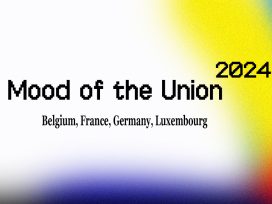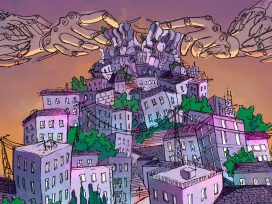
Moreart 2013 – Upfield Bike Path Cameron Street – Estate by Liz Walker
Photo by John Englart from Flickr
The New Right movements and parties that emerged in 1950s Europe may have turned away from an open commitment to National Socialism and fascism, eschewed racial vocabulary and addressed the interests of the average citizen, but they still embraced inequality as a natural social order. Their economic and social policy agenda therefore became neoliberal, opposing the welfare state and placing emphasis on individual responsibility. In recent years, a renewed reorientation of rightwing currents and parties has been observed: ‘They accuse the elite of destroying the welfare state to incorporate the immigrants, their alleged new electorate, and call for a welfare state for their “own people” first’.
Urban housing policy strikingly reveals the contradictory relationship between social policy and market radicalism posed by New Right and rightwing populists. National Socialism invoked hostility to big cities, targeting urban ways of living and urban social transformations in particular. It believed that society was spatially determined and people were naturally unequal. Notions of idealized, simple, rural ways of life in self-sufficient, small-scale ownership, family networks living close to nature inspired National Socialism’s attempts to restrict forms of urban socialization and political idiosyncratic thinking. This National Socialist anti-urban urban planning was connected with a departure from public housing construction and the privatization of residential space.
While the free-market and social-protectionist factions that exist within rightwing parties wage programmatic battles over which course to take, their increasing weight in parliaments across Europe means rightwing parties are confronted with the task of making social politics. In view of a loss of trust in establishment politics, they do not want to pass up the ‘opportunity to anchor rightwing outlooks in broader layers of the people’. The crisis of insufficient housing, especially in growing cities, is a pressing socio-political issue. So have rightwing populists recognized the problem and how do they want to solve it?
We can get an idea by taking a systematic look at the rightwing press and the records of their parliamentary debates. From 2015 to 2018, a keyword catalogue was produced as part of media analysis for the Democracy, Populism and the City research project, which identifies connections between urban development and a shift to the right. More than 2,000 sources were collated from the rightwing press: the weekly newspaper Junge Freiheit, the monthly magazine Compact and the online magazine Blaue Narzisse. Questions, motions and contributions made by the Alternative für Deutschland (AfD) rightwing party in German parliamentary debates were also documented.
Analysis both focuses on a federal level and looks closely at Saxony, including Leipzig, and Baden-Württemberg, including Stuttgart. It reveals the AfD’s policy suggestions for solving the housing question from opposition. At its core, this a message in three parts – promoting home ownership, encouraging investment and stopping migration – echoing the aforementioned anti-urban urban development and housing policies.
This anti-urban pattern of contemporary rightwing housing policy can be traced by looking at the underlying ideas regarding urban socialization, conflict resolution and the civil society-related design of cities. The following overview presents the opinions and patterns of rightwing argumentation, paying attention to how rightwing policy interventions target the participation and co-management of tenants or urban planners to undermine the very pillars of democratic civil society.
Interpretations offered by rightwing populism
Rightwing populists do not deny that there is insufficient housing. The cause, they claim, is a weak construction sector. They blame anti-investor policies (rent controls) and excessive bureaucracy (land reclassification) for minimal construction activity. High property tax and regulations for energy-efficient renovations, they argue, have driven up construction costs. The housing market is ‘significantly disturbed in how it functions by Green and Red ideologues’.
In addition to highlighting ‘regulatory madness’ behind the neoliberal housing issue, repeated criticism is levelled at social policy failures. For example, the AfD sees an ‘increasing demand for social housing’, which is met by ‘a decreasing supply’, of provision that is now ‘largely privatized’. Even ‘luxury housing’ is occasionally the target of ire, because ‘needs […] are sacrificed to profit maximization’. Rightwing populists obviously do not agree amongst themselves on the appropriate level of market regulation. Indeed, social policy action does not necessarily follow on from a discussion of social problems.
Rightwing populists suppress the contradiction between market radicalism and social protectionism by promoting competition for resources. They link state responsibility for social housing provision with migration and refugee policy. Welfare policy is not interpreted as an inclusive right by rightwing populists, who consider that sociopolitical rights and entitlements should not be extended to migrants. However, the rightwing does not even focus on redistribution and participation for those privileged by inclusion but on disciplining and devaluing those who are not performing well in neoliberal society, as illustrated by the ongoing denigration and criminalization of poverty in the public sphere.
Housing supply and demand
The relationship between residential property and tenancy must be understood against this backdrop. From the rightwing populist perspective, those who own residential property are politically capable of action and decision-making whereas those who rent are ‘at others’ mercy’ and ‘dependent’.
Linking housing supply with migration policy is a means of consolidating market ideology. After all, ‘without immigration we would have a balanced housing market’. Only the ‘policy of open borders’ and ‘immigration without an upper limit’ is deemed to have created domestic strife. Rightwing populists claim that rising rents and the lack of affordable housing is caused by competition between demand groups. In cities, they allege, there is a ‘merciless struggle for affordable housing’, a veritable ‘tenants’ war’. Hardworking, blameless citizens, who may have suffered ‘tragedy’, ‘expulsions’ or even a ‘humanitarian catastrophe’ are set against faceless masses of refugees, who are to blame for Germans being driven out of their homes and taxpayers’ money being wasted.
Politicians, they claim, provide refugees with advantages in the housing market by, for example, assigning them social housing faster than they do to Germans or fast-tracking the construction of housing for refugees. Rightwing populists problematize the housing of migrants in cities by appealing to stereotypical notions of ‘ghetto formation’, ‘parallel societies’ or ‘no-go areas’. They put an alleged problem with migration and asylum before the housing question, thereby relegating the need for welfare state activity. Migration and asylum become the justification for enforcing neoliberal policies.
The political offer of rightwing populists
These perspectives match political proposals for the housing market’s ‘massive deregulation’, ‘turning tenants into owners’ and promoting the acquisition of ‘detached single-family homes’ as top-priority slogans. In general, the idea that tenants are first and foremost market actors is the entrenched focus. Anyone entering the rental market, they argue, should be able to assert themselves without any need for state intervention. Where rightwing populists usually insist on more participation and referenda, here a government would unilaterally ‘cut back’ ‘inflated citizen participation’to promote a deregulated housing market. Rightwing populists are guided by the normative myth of the middle-class family with a little house on the outskirts of the city. The landlord, idealized in the rightwing populist free-market vision, owns a four-family house in which he himself also lives. In this vision, everyone – owner, landlord and tenant – rallies behind the abolition of property tax in order to rein in out-of-kilter rental and property prices.
A specifically urban way of life, understood as condensed diversity, does not figure in the spectrum between a detached house and a four-family house. If they address the issue of diversity at all, rightwing populists relate it purely to labour supply, trade and gastronomy. Migrant-based economies simply do not feature in their vision of a uniform cityscape. In terms of architecture, the rightwing populist’s idea of heterogeneity is reflected in mock half-timbered or Gründerzeit-style houses, echoing the 19th century founders’ period, instead of standardized new builds.

A ‘Gründerzeit’ house
Photo by Lucas Friese from Wikimedia Commons / Lucas Friese / Public domain
Beyond tax cuts, the rightwing populist’s policy on social housing becomes contradictory and patchy. According to the party newspaper AfD Kompakt, an AfD spokesman ‘criticized proposals […], to use pre-emption rights to intervene more strongly in the housing market’ and the party proposes a ‘programme for the privatization of the apartments of urban associations’. Elsewhere, however, there are demands to ‘strengthen pre-emption rights’ and protests against expanding public housing stock.
Similar contradictions exist between the demand for less red tape when designating land for new-builds and for more restrictions in individual cases (e.g., when it comes to the preservation of meadows or allotment gardens). Their housing proposals are meant to be adapted to local forms of housing and life. In Stuttgart and Baden-Württemberg, for example, the detached-house model is more prominent than in Berlin, where there is greater demand for cooperative housing.
There is agreement that immigration should be restricted to reduce competitive pressure on the housing market. And demands are being made for an appropriate municipal legal framework that would restrict migrant rights and promote their long term accommodation in shipping containers to curb any desire to settle in the city.
Overall, the rightwing’s position on housing recasts the sector’s socio-political aspects and supply-oriented housing policy through the lens of culturalization, disregarding social circumstances and living conditions. Greatly hyped new-build projects are marshalled in individual cases to help preserve a specific city identity said to be endangered by brownfield infill development (e.g., Stuttgart is portrayed as a ‘world city between forest and vineyards’ characterised for its ‘garden city [traits], not high-rise buildings’). In order to construct such urban identities, rightwing populists invoke direct associations with village life.
Culturalization of the housing issue
Rightists seek to fan their trumped-up ‘resource competition’ into a full-blown ‘clash of civilizations’, one that feeds on the ‘desire for disaster’. According to them, ‘the most important social conflicts of modern times are primarily driven not by social differences and demands but by cultural ones. The course of gentrification proves it’. They consider rising property prices and displacement a problem, because these issues loosen ties and roots, and threaten to create a civil war between cosmopolitans and ordinary citizens, ‘with incalculable consequences’. Here, gentrification is reduced to the level of lifestyle choices with little light shed on its underlying economic dynamics. Rightwing actors view gentrification from a demand-oriented perspective: the decisive factor is not investment strategies but rather the housing preferences of those who are able to make the choice.
The story is one of ‘displacement competition’ in which an academic elite mobilizes its privileges against long-established residents, especially Germans. Alliances between immigrants and longstanding residents are seemingly not considered a possibility. Gentrification is reduced to being perceived as the self-effacing lifestyle of a ‘green academic milieu’. The rightwing media concludes that ‘the Greens [are] the winners of the same gentrification that they attack so strongly’.
The interplay between rightwing urban and rural housing policies also reveal that this group understands segregation as competition between socio-cultural milieus. Here, the complaint that low earners would be ‘banished to the countryside’ as ‘any space […] open[ed] up is immediately occupied by foreigners’ dispenses with the rural idyll and posits the battle in cities.
When it comes to housing, property ownership is promoted through political enticements based on notions of belonging and identity. Few of the sources under investigation discuss housing in relation to municipal planning and design. Comments on these topics are limited to denouncing past and present fields of action such as district design, social work, municipal housing construction and state interventions in the housing market, or ruling them out as options for future action.
For rightwing populists, housing policy should focus on the detached house and unregulated brownfield infill with suburban, four-family houses. Their political vision presents the individual with an uncompromising urban housing market struggle. It interprets tenants’ experiences of injustice and powerlessness as discrimination against Germans, which invokes less naming and shaming of investors and more denunciation of communal landlords and ‘speculators from all over the world’. For rightwing populists, the solution is always individual home ownership.
Large housing estates and urban development
Large housing estate and satellite town developments are generally criticized by rightwing populists as exampled by an AfD representative’s comment recorded in the Stuttgart municipal council minutes: ‘even if the emergency list runs to 4,500 households, the construction of satellite cities like in Munich is the wrong way to go’. Junge Freiheit sees large housing estates as ‘desolate’ residential areas, to which, ‘for a long time, […] no one has moved voluntarily’. Rightwing agents see this as a failed housing construction model that was best suited to the East and West German ‘construction period’. They also disagree with the planned economy and ‘socialist housing policy’ lurking in contemporary municipal building regulations and interventions in the rental market, especially within Berlin’s housing policy.
This housing policy reference to the GDR can be pursued further. Ownership structures are linked with urban development within the claim that the ‘small-scale Old Town’ has been ‘cleared out’ by nationalized land. Reconstruction presupposes reprivatization. Plainly, for the Right, it is precisely private ownership that can be relied upon to uphold the historic identity of a city, with assistance from official monument protection programmes. Similarly, the Hamburg faction of the AfD demands that ‘in newly developed residential areas at least two thirds of the land should be sold to private developers without any design-related conditions placed on the sale’ and raises, as a historical positive example, the ‘diversity’ of Gründerzeit buildings.
Citizen participation
The rightwing populist perspective has consequences for the development of participation in communal city life. In contrast to municipal housing policy, which focuses on the structures of the housing market, the accusation of ‘socialist’ housing policy fans mistrust in political elites. The Berlin administration’s announcement to make use of pre-emption rights is assumed, for example, to ‘facilitate the acquisition [of apartments] for a clientele close to the Senate parties’.
Here, too, this dichotomy between the general public and elites is understood in terms of powers to act and shape the urban environment, powers which are determined by structures of property ownership. In political debates on a municipal level, rightists argue that whereas this clientele can choose their place of residence, the inhabitants of large housing estates are at the mercy of their living conditions in neighbourhoods that are forgotten and left behind by political responses, especially in relation to crime.AfD Kompakt, ‘ And so when it comes to citizen participation, the rightwing’s starting point ascribes passivity and abandonment that calls for authoritarian governance.52
Public participation is once again reduced to making narrow decisions. If acknowledged at all by rightwing actors, democratic district design is regarded as a burden for inhabitants and a political failure for municipalities. Either participation amounts to voting formats aimed at authoritarian decisions or rightwing populists reject it as wholly unnecessary. Policies such as left-wing housing initiatives are defamed and criminalized in rightwing perceptions.
Only rural areas appear to enjoy the right to shape society: ‘the countryside does so much for the whole of society’. Here, ‘cultural identity and the country life’ surpasses ‘shipping container accommodation’ and ‘housing ghettoes’.
Seen within this register, the countryside needs to be strengthened to reduce the flow into cities.
Market forces verses social policy
The New Right and rightwing populist handling of the housing question delegates social and political matters to the free interplay of market forces. From their point of view, the housing crisis cannot be overcome through social policy. On the contrary, their panacea is private home ownership. Rightwing actors link the housing issue to refugee and migration policies to justify this view. Urban society is considered competition between the strong and weak built firstly along national lines and then organised through the market.
For rightwing parties and movements, urban integration and identity are dependent on culturalization and homogenization, which eclipse problems of social inequality. Urbanity’s heterogeneity and inconsistency is understood as disorder rather than a strength. Accordingly, it is supposed that a city must be ruled authoritatively. Legitimized by the rise of referendums supported by the AfD across the political spectrum, such a political position even presents itself as the last word in citizen participation but, in actual fact, trivializes it.
In its anti-urbanism, the rightwing populist dream of residential property limits the possibilities for social and specifically neighbourhood-level conflict resolution, design and integration. As a result, rightwing perspectives also tend to intensify current democratic housing crises.









